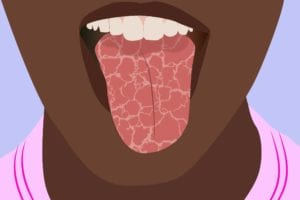It’s normal for your mouth to go dry when you’re nervous or haven’t sipped any water all day. But for people whose salivary glands don’t produce enough saliva, dry mouth becomes a chronic condition that can be uncomfortable and even interfere with speaking and swallowing.
“Saliva also plays a critical role in protecting your mouth against bacteria, so people without enough saliva might be more likely to have periodontal disease,” says Felipe Andrade, MD, PhD, an associate professor of medicine at Johns Hopkins University School of Medicine in Baltimore.
Read more about managing oral health problems when you have arthritis.
Symptoms of Dry Mouth
Dry mouth isn’t just about feeling thirsty. People with chronic dry mouth may experience the following symptoms:
- Dryness or stickiness in the mouth
- Thick saliva
- A burning sensation in the mouth
- Changes in the way food tastes
- Sensitivity to acidic or spicy foods
- Trouble chewing or swallowing
- Difficulty speaking
- Bad breath
- Dry, sore throat
- Hoarseness
What Causes Dry Mouth in People with Arthritis?
Medication
Some arthritis medications — such as non-steroidal anti-inflammatory drugs (NSAIDs) like Celebrex — can dry out salivary glands.
Sjögren’s syndrome
Another major cause of dry mouth is Sjögren’s syndrome, an autoimmune disorder that targets moisture-producing glands like the ones like make saliva and tears, says Dr. Andrade. The main symptoms of Sjögren’s are dry mouth and dry eyes, but Sjögren’s can also cause fatigue, skin rashes, and joint pain and swelling.
Some of those symptoms may sound very familiar to people with inflammatory arthritis: Rheumatoid arthritis patients are at increased risk of Sjögren’s. In fact, research suggests that up to 31 percent of RA patients also have the syndrome. (In these cases, Sjögren’s is considered “secondary.”)
Treatment for Dry Mouth
There’s no cure for Sjögren’s syndrome, so treatment mostly centers around making your mouth comfortably moist, and reducing the risk of gum disease and cavities caused by the lack of saliva. Here’s what Alan Baer, MD, director of the Jerome Greene Sjögren’s Syndrome Clinic at Johns Hopkins Medicine, recommends to his patients.
Rinse and spit: Prescription SalivaMAX is a supersaturated calcium phosphate rinse that is soothing and helps protect your teeth, says Dr. Baer. (Two others that work similarly are Caphasol and Aquoral.) “You can also make a mouth rinse at home, consisting of one teaspoon salt and one teaspoon of baking soda in one liter of water,” he says. It will hydrate your mouth and neutralize acids to prevent cavities.
Oil up: Spread a few drops of vitamin E oil on your tongue and around the inside of your cheeks. It is soothing and will help protect the integrity of the mucous membranes in your mouth, says Dr. Baer. But be sure to call your doctor if you notice the tissues are red and irritated, he notes. That can be a sign of a fungal (or yeast) infection that needs prescription treatment.
Call in the subs: There are many over the counter “saliva substitutes” available in drugstores and on Amazon that can help replace moisture in the mouth. These sprays, gels, and lozenges most have ingredients like carboxymethylcellulose or hydroxyethylcellulose — substances that increase the viscosity, or thickness, of the fluids — and some also include fluoride to help protect your teeth. Dr. Baer suggests trying several different brands to find what works best for you. He says that some of his patients like Thayer’s Natural Remedies Dry Mouth lozenges, which help stimulate saliva production.
Consider a CoQ10 supplement: Although more research is needed, Dr. Baer says some people with dry mouth may benefit from a dietary supplement known as Coenzyme Q10. One small, placebo-controlled clinical trial in Japan found that 100 mg a day of CoQ10 improved saliva flow in Sjögren’s patients after one month.
Ask your doctor about medication: If you’re not able to get relief from other measures, it might be time to consider medications. There are several drugs that are FDA-approved to treat dry mouth, but they have potential side effects and some can interact with other medications or make underlying conditions like heart arrhythmias worse. These include pilocarpine (Salagen) or cevimeline (Evoxac), which boost saliva production.
Switch medications that can be contributing to dry mouth: Talk to your doctor about all the medications you take, as it may be the case that some (even those you take for reasons unrelated to arthritis) can cause dry mouth as a side effect. In particular, antihistamines and decongestants are known for causing dry mouth.
Lifestyle Changes for Dry Mouth
Investigate snoring: Breathing through your mouth can make dry mouth worse. Dry mouth is also more common among people with sleep apnea; snoring is a common sleep apnea symptom. If you know you snore or your partner complains about your snoring, talk to your doctor about a sleep study. Treating sleep apnea could also address your dry mouth.
Moisturize: Add moisture to your room with a humidifier or use lip balm to soothe dry lips.
Avoid foods and drink that can make dry mouth worse: These include alcohol (including mouthwash that contains alcohol), caffeine, tobacco products, and sugary foods (which can increase your risk of cavities).
Keep sugar-free sweets handy: Chewing gum or sucking on candies stimulates saliva flow, so Dr. Baer suggests that patients keep some on hand. Just make sure they’re sugar-free. Chronic dry mouth increases the risk of cavities, so it’s important to keep sugary treats and drinks to a minimum.






